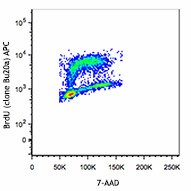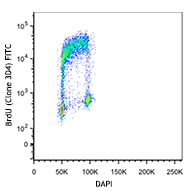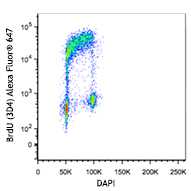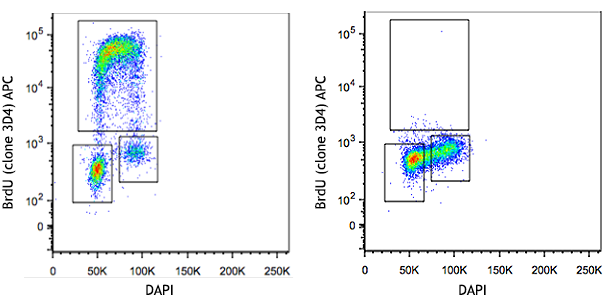- Regulatory Status
- RUO
- Other Names
- 5-Bromo-2'-Deoxyuridine, BUDR , 5-BrdU, 5-Bromouracil deoxyriboside, 5-Bromo-1-(2-deoxy-beta-D-ribofuranosyl)uracil
- Ave. Rating
- Submit a Review
- Product Citations
- publications

-

Human T lymphoblastic leukemia cell line, HUT-78, was pulsed with BrdU for 1 hour, and then stained with anti-BrdU (clone Bu20a) APC by following BrdU staining procedures. 7-AAD was added before the sample acquisition. -

BALB/c mouse was injected with BrdU. Two hours later, the bone marrow cells were harvested and then stained with anti-BrdU (clone Bu20a) APC by following BrdU staining procedures. 7-AAD was added before the sample acquisition.
| Cat # | Size | Price | Quantity Check Availability | Save | ||
|---|---|---|---|---|---|---|
| 423401 | 25 mg | 62€ | ||||
Bromodeoxyuridine, also known as BrdU (MW=307.1 Da), is a synthetic analog of thymidine that is incorporated into DNA during S-phase of the cell cycle. BrdU is rapidly assimilated by proliferating cells and can be detected with anti-BrdU specific antibodies by different techniques like flow cytometry, immunofluorescence, and immunohistochemistry. BrdU is widely used to measure DNA synthesis, study the cell cycle, and identify proliferating cells. In addition, it has been used as an antiviral and antineoplastic drug.
Product DetailsProduct Details
- Formulation
- This product consists of 5 vials. Each vial contains 5 mg/500 µl of BrdU in an aqueous solution.
- Preparation
- This BrdU solution has been filtrated through a 0.22 µm membrane and contains no preservatives.
- Concentration
- 10 mg/ml
- Storage & Handling
- Store at -70°C upon receipt. Once thawed, the solution is stable between 2°C and 8°C for 4 weeks. Avoid repeated freeze/thaw cycles. Protect from light. Handle in aseptic conditions.
- Application
-
ICFC - Quality tested
- Recommended Usage
-
Recommended usage includes in vivo and in vitro measurement of DNA synthesis, study of the cell cycle, and labeling of proliferating cells.
- Application Notes
-
This product can be used for in vivo and in vitro labeling of proliferating cells as described in the following protocols:
a) Administration in drinking water: Dilute the BrdU in drinking water to a concentration of 0.8-1.0 mg/ml. Give to animals for consumption ad libitum for up to 4 weeks.
Note: This solution should be protected from light and should be refreshed at least every 3 days. BrdU can be toxic, even lethal. If animals are going to be fed with BrdU for more than 2 weeks, then closely monitor the animals for signs of toxicity.
b) Administration by injection: Dilute the BrdU in sterile saline solution or PBS for a dose of 50-100 mg BrdU/kg, inject the animal intraperitoneally (i.p.) or intravenously (i.v.). In actively proliferating cells, BrdU-labeled DNA can be detected within one hour of the injection.
c) In vitro administration of BrdU: Dilute the BrdU 1:30 (0.33 mg/ml) with sterile media and pulse the cells by adding 10 µl of this solution to each ml of cultured cells, BrdU final concentration is 10 µM (3.3 µg/ml). A cell density =2x106 cells/ml is commonly used; incubate the cells for desired time.
Note: Special care should be taken to not disturb the cells before pulsing them with BrdU and during the incubation time (e.g. avoid changes in temperature and do not centrifuge the cells), as it may interfere with the cell cycle.
The protocols above outline three recommended uses for this product. Final conditions will depend on the purpose of the experiment and characteristics of the target cells. - Product Citations
-
Antigen Details
- Structure
- Nucleoside derived from uridine, 307.1 Da, molecular formula C9H11BrN2O5
- Biology Area
- Apoptosis/Tumor Suppressors/Cell Death, Cell Biology, Cell Cycle/DNA Replication, DNA Repair/Replication, Signal Transduction
- Antigen References
-
1. Barker JM, et al. 2013. PLoS One 8:e63692.
2. Duque A and Rakic P. 2011. J. Neurosci. 31:15205.
3. Robbins S, et al. 2011. J. Vis. Exp. 55:2855.
4. Broekhuizen CA, et al. 2010. Infect. Immun. 78:954.
5. van der Wath RC, et al. 2009. PLoS One 4:e6972. - Gene ID
- NA
Related Pages & Pathways
Pages
Related FAQs
Customers Also Purchased



 Login / Register
Login / Register 














Follow Us